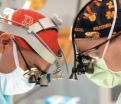(Press-News.org) The adult offspring of parents who were addicted to drugs or alcohol are more likely to have arthritis, according to a new study by University of Toronto researchers.
Investigators examined a group of 13,036 adults and found that 20.4 per cent of respondents had been diagnosed with arthritis by a medical professional. Investigators found that 14.5 per cent of all respondents reported having at least one parent whose drug or alcohol use caused problems while were under the age of 18 and still living at home.
Results indicate that individuals whose parents were addicted to drugs or alcohol are more likely to have arthritis. After adjusting for age, sex, and race, parental addictions were associated with 58 per cent higher odds of arthritis, says lead author Esme Fuller-Thomson, Professor and Sandra Rotman Endowed Chair in the University of Toronto's Factor-Inwentash Faculty of Social Work and the Department of Family and Community Medicine.
"We had anticipated that the adult offspring's health behaviors such as smoking, obesity and alcohol consumption might explain the strong link between parental addictions and arthritis, however we did not find this to be the case. Even after adjusting for these adult health behaviors, as well as income, education, a history of childhood maltreatment and mood and anxiety disorders, we found that parental addictions was still a statistically significant factor associated with 30 per cent higher odds of arthritis" explains study co-author and recent MSW graduate, Jessica Liddycoat.
Future prospective studies are needed because the survey nature of the data makes it impossible to determine whether the relationship between parental addictions and arthritis is causal.
"However, there is ample evidence from other studies to support the provision of efficacious interventions to treat addictions." says coauthor Maria Stefanyk. "Although we do not know if these interventions will impact the development of arthritis in adulthood, we do know that children do much better on a wide range of outcomes when parents are no longer abusing drugs and alcohol."
Fuller-Thomson's research appears online this week in the International Journal of Population Research.
INFORMATION:
Link to research: http://www.hindawi.com/journals/ijpr/2014/582508/ END
Parental addictions associated with adult children's arthritis
Arthritis in adulthood is linked to parental addictions during childhood, according to a new study by University of Toronto researchers
2014-03-26
ELSE PRESS RELEASES FROM THIS DATE:
Study finds secret to cutting sugary drink use by teens
2014-03-26
COLUMBUS, Ohio – A new study shows that teenagers can be persuaded to cut back on sugary soft drinks – especially with a little help from their friends.
A 30-day challenge encouraging teens to reduce sugar-sweetened drink use lowered their overall consumption substantially and increased by two-thirds the percentage of high-school students who shunned sugary drinks altogether.
The "Sodabriety" challenge, piloted by Ohio State University researchers, was an effort to confront the largest source of added sugar in the U.S. diet: sugar-sweetened soft drinks, sports and energy ...
Scientists track 3D nanoscale changes in rechargeable battery material during operation
2014-03-26
UPTON, NY-Scientists at the U.S. Department of Energy's Brookhaven National Laboratory have made the first 3D observations of how the structure of a lithium-ion battery anode evolves at the nanoscale in a real battery cell as it discharges and recharges. The details of this research, described in a paper published in Angewandte Chemie, could point to new ways to engineer battery materials to increase the capacity and lifetime of rechargeable batteries.
"This work offers a direct way to look inside the electrochemical reaction of batteries at the nanoscale to better understand ...
New clue to autism found inside brain cells
2014-03-26
The problems people with autism have with memory formation, higher-level thinking and social interactions may be partially attributable to the activity of receptors inside brain cells, researchers at Washington University School of Medicine in St. Louis have learned.
Scientists were already aware that the type of receptor in question was a potential contributor to these problems – when located on the surfaces of brain cells. Until now, though, the role of the same type of receptor located inside the cell had gone unrecognized. Such receptors inside cells significantly ...
Counting calories in the fossil record
2014-03-26
Starting about 250 million years ago, at the end of the Permian period, brachiopod groups disappeared in large numbers, along with 90 percent of the planet's species. Today, only a few groups, or genera, of brachiopods remain. "Most people won't be familiar with brachiopods. They're pretty rare in the modern ocean," said Jonathan Payne, a paleobiologist at Stanford University.
Meanwhile, bivalves flourished, diversifying into a staggering variety of shapes and sizes, and spread from marine to freshwater habitats. "After the end-Permian mass extinction, we find far fewer ...
Last drinks: Brain's mechanism knows when to stop
2014-03-26
The study found a 'stop mechanism' that determined brain signals telling the individual to stop drinking water when no longer thirsty, and the brain effects of drinking more water than required.
Researcher Professor Derek Denton from the Faculty of Medicine, Dentistry and Health Sciences at the University of Melbourne said the study provided insight into the human instincts that determine survival behaviour and are also of medical importance.
"Different areas of the brain involved in emotional decision-making were activated when people drank water after becoming ...
Two spine surgeons are 3 times safer than 1
2014-03-26
Seattle, WA—A new team approach has improved safety—reducing rates of major complications by two thirds—for complex spinal reconstructive surgery for spinal deformity in adult Group Health patients at Virginia Mason Hospital & Seattle Medical Center. An article in the March issue of Spine Deformity gives a detailed description of the standardized protocol before, during, and after the surgery, stressing the new approach's three main features:
Two spine surgeons in the operating room
A live preoperative screening conference
Monitoring bleeding during the operation
The ...
ATHENA desktop human 'body' could reduce need for animal drug tests
2014-03-26
Creating surrogate human organs, coupled with insights from highly sensitive mass spectrometry technologies, a new project is on the brink of revolutionizing the way we screen new drugs and toxic agents.
ATHENA, the Advanced Tissue-engineered Human Ectypal Network Analyzer project team, is developing four human organ constructs – liver, heart, lung and kidney – that are based on a significantly miniaturized platform. Each organ component will be about the size of a smartphone screen, and the whole ATHENA "body" of interconnected organs would fit neatly on a desk.
"By ...
Life expectancy gains elude overweight teens
2014-03-26
Washington, DC—Although people live longer today than they did 50 years ago, people who were overweight and obese as teenagers aren't experiencing the same gains as other segments of the population, according to a new study published in the Endocrine Society's Journal of Clinical Endocrinology & Metabolism (JCEM).
The life expectancy of the average American born in 2011 was 78.7 years, according to the U.S. Centers for Disease Control and Prevention. The average lifespan has increased by more than a decade since 1950, but rising obesity rates threaten to take a toll on ...
Sugary drinks weigh heavily on teenage obesity
2014-03-26
New research shows sugary drinks are the worst offenders in the fight against youth obesity and recommends that B.C. schools fully implement healthy eating guidelines to reduce their consumption.
Data from the 2008 Adolescent Health survey among 11,000 grade seven to 12 students in British Columbia schools indicates sugary drinks like soda increased the odds of obesity more than other foods such as pizza, french fries, chips and candies.
The study, published today in the International Journal of Behavioral Nutrition and Physical Activity, found that students in schools ...
Research: Less invasive technique possible in vulvar cancer treatment
2014-03-26
A team of researchers from Women & Infants Hospital of Rhode Island commanded a national stage to present the results of a study evaluating the use of sentinel lymph node dissection in women with vulvar malignancies, and then follow the patients for complications and recurrence.
The team – Drs. Richard G. Moore, Dario Roque, Carolyn McCourt, Ashley Stuckey, Paul A. DiSIlvestro, James Sung, Margaret Steinhoff, Cornelius Granai III, and Katina Robison – presented their work at the annual meeting of the Society of Gynecologic Oncologists (SGO) in Tampa. The oral presentation ...
LAST 30 PRESS RELEASES:
Why do we get a skip in our step when we’re happy? Thank dopamine
UC Irvine scientists uncover cellular mechanism behind muscle repair
Platform to map living brain noninvasively takes next big step
Stress-testing the Cascadia Subduction Zone reveals variability that could impact how earthquakes spread
We may be underestimating the true carbon cost of northern wildfires
Blood test predicts which bladder cancer patients may safely skip surgery
Kennesaw State's Vijay Anand honored as National Academy of Inventors Senior Member
Recovery from whaling reveals the role of age in Humpback reproduction
Can the canny tick help prevent disease like MS and cancer?
Newcomer children show lower rates of emergency department use for non‑urgent conditions, study finds
Cognitive and neuropsychiatric function in former American football players
From trash to climate tech: rubber gloves find new life as carbon capturers materials
A step towards needed treatments for hantaviruses in new molecular map
Boys are more motivated, while girls are more compassionate?
Study identifies opposing roles for IL6 and IL6R in long-term mortality
AI accurately spots medical disorder from privacy-conscious hand images
Transient Pauli blocking for broadband ultrafast optical switching
Political polarization can spur CO2 emissions, stymie climate action
Researchers develop new strategy for improving inverted perovskite solar cells
Yes! The role of YAP and CTGF as potential therapeutic targets for preventing severe liver disease
Pancreatic cancer may begin hiding from the immune system earlier than we thought
Robotic wing inspired by nature delivers leap in underwater stability
A clinical reveals that aniridia causes a progressive loss of corneal sensitivity
Fossil amber reveals the secret lives of Cretaceous ants
Predicting extreme rainfall through novel spatial modeling
The Lancet: First-ever in-utero stem cell therapy for fetal spina bifida repair is safe, study finds
Nanoplastics can interact with Salmonella to affect food safety, study shows
Eric Moore, M.D., elected to Mayo Clinic Board of Trustees
NYU named “research powerhouse” in new analysis
New polymer materials may offer breakthrough solution for hard-to-remove PFAS in water
[Press-News.org] Parental addictions associated with adult children's arthritisArthritis in adulthood is linked to parental addictions during childhood, according to a new study by University of Toronto researchers




